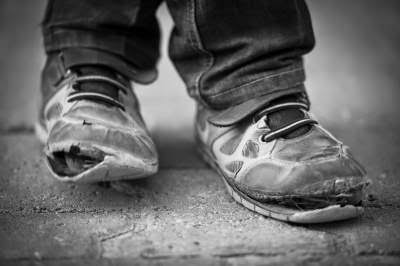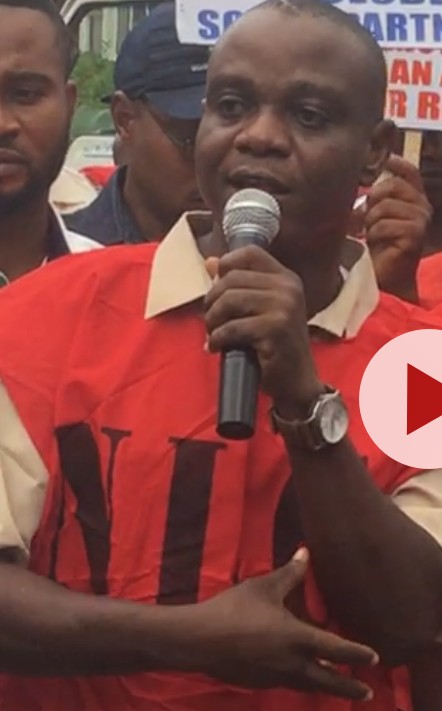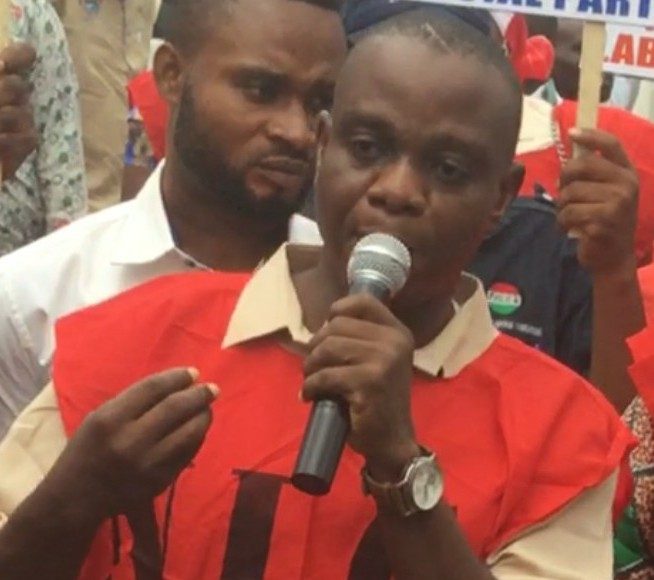Comrade Eustace Imoyera James, is the Coordinator National Trade Union Migration Network with the Nigeria Labour Congress (NLC). In this interview with THE LABOUR crew, he shared his thought on how an effective social security system could help better the living condition of Nigerians.
The International Labour Organisation (ILO) is very concerned that many countries have poor or no social security system, and has been campaigning for countries to invest in social security towards achieving sustainable development. Looking at Nigeria’s current situation regarding unemployment and a lot of social vices, to what extent would an effective social security system help to change the narrative?
Extending social protection and social security to workers and Nigerians in general is one of the major pillars of decent work agenda. Universally as contained in the Sustainable Development Goals (SDGs), decent work is one of the means through which poverty can be eradicated. It is one of the means through which we can contend the rising poverty rate and deal with its issues, especially as it concerns security challenges and other social vices in Nigeria.
So extending social security to all citizens especially the unemployed youth is a cardinal objective government should take on board. And when we are talking about social security, we should be looking at something universal and serious. Because in Nigeria, there some pocket of social security policies and services already existing, but they are not universal in nature neither are they effective.
In fact, social protection/social security should be institutionalized and run target-fully with all manner of seriousness in Nigeria. Nigeria must have some form of effective social protection system that targets the unemployed, children, and the aged, if it ever hope to breath a fresh air of peace and development like other sane nation. There is no country that is thirsty of development and inclusive wealth, that would not invest in its youths through well managed and effective social security.
The insensitive of those who govern Nigeria to the degrading level of penury many citizens suffers, and how insane many have become due to their inability to meet up with basic needs of life, as a result of the humongous job deficits in the country is so obvious. And most unfortunate is that they are turning blind eyes to the looming consequences that are fast approaching. If nothing is fast done, it would be like doom. Their high walls will not save them at all.
For instance, almost every former worker in Nigeria today are in one form of social security. Some are either enjoying the contributory pension scheme or contributory health insurance scheme, and so many other schemes. But for those who are not working, for the children, the aged who do not have the opportunity to be in the formal sector; they are left with noting. That is why we are talking about universal social protection.
What are the key elements of universal social protection? First is universal free quality accessible basic education. If every child has access to free basic education for the first nine years of schooling. You will find out that it will lift a big burden on their parents, who are either unemployed or their salary is so meager. So when they are enjoying that state social protection system; by having free education for their children, whatever they earn they could use it to subsidize their living.
We should have universal basic health, at least primary health service provided by the State. A social protection provision in form of free primary health care, whereby people; maybe the under age, pregnant women or the aged can access some health care service free of charge that is of quality, you would find out that the living standard of many people in the country would increase drastically. They said that a healthy nation is a wealthy nation.
Also, an effective conditional cash transfer system which in some countries is called unemployment benefit, would do our country good. Nigeria is known to be a country of hunger population of youths. As at today, there are over 81 million unemployed youths in Nigeria. This is about 63.4% of the country’s labour force. And yet, this huge number of youths have no means of any social security. No unemployment benefit or cash transfer, no bursary for those in school, no form of social protection at all. Honestly, we are in a crisis.
If we have an effective conditional cash transfer system, free quality accessible education, unemployment benefit for the youths, you will see that the living standard in Nigeria would improve and ultimately curtail the increasing high rate of crime and other social vices that are leading to the security challenges facing the country.

The current administration said it is already offering cash transfer to some people, what is your take about it?
I am aware that the current administration say they are doing conditional cash transfer as part of it social investment, but how reaching is it? How many Nigerians are accessing it and how many states are? These are the basic questions. Like I earlier said, Nigeria has over 81 million unemployed youths. I am not sure that the people that are accessing the current cash transfer are up to 2million.
But unfortunately it is being branded by the Vice President everywhere he goes. Against over 81 million unemployed youths that has no sources of income, what is 2million people, that is, assuming up to that figure is accessing it. We are not even talking about those that are poor, just the unemployed youths. So what are we talking about? Considering the reality, does the current so called cash transfer in the manner it is done, make sense at all? I am not saying that every one much enjoy the conditional cash transfer but are those who actually suppose to get it, accessing it?
Yes, everybody in the country must not enjoy conditional cash transfer but if you have other social protection measures in place. Assuming for instance you have free quality accessible education, many people would not bordered about accessing cash transfer. If you have employment being created, a person that is working doesn’t need conditional cash transfer. In fact, conditional cash transfer is not even a priority. It is not among the most burning issues when you are talking about social security or social protection for the citizens. Universal basic education, health service, housing, job creation etc, are.
Free education is so important when talking about social protection, because as a worker, 80% of your salary goes into paying children school fees and other school expenses. So when about 80% is used for school expenditure alone, how much is left. But with quality accessible free education, you would save a huge some of your monthly pay and utilize it for other things.
Decent work: what are the decent work programs we have in Nigeria?
Nigeria has what we call decent work country program, which has been adopted since 2005. But the question is, are we implementing it? Decent work has four basic pillars. In the concept of decent work; the first priority is Promotion of employment…by creating a sustainable institution and conducive economic environment. This is essential because job is one of the key factors that takes man out of poverty.
Once you have a job, earn a decent living wage, you will definitely live above poverty cycle. If you have a job where you enjoy freedom, you will be happy. Importantly, if you have a job where you have social security, that even if you lose your job; you know that there is something to fall back to. With all these in place, you find out that the society would be conducive for everyone. So Nigeria government should tell us if they are implementing the country’s decent work program.
After promotion of employment, another critical element of decent job is social security. Adopting and extending social protection measures to workers. Because for every country, every worker has dependants and in the case of Nigeria; the last study shows that every Nigerian worker has about seven dependants who lives on his or her income. What it mean is that for every 1 million workers, there are 7 million people living and surviving from the 1 million. If these 1 million people earn a living wage that can afford them basic things of life, 7million people would automatically be on their way out of poverty line.
So decent work covers it all. Pay people good wage, let there be social security or social protection, then give workers a voice. Because when you give them voice, there would industrial peace, and when there is peace, productivity would definitely increase.

Why does it seem so difficult for these wonderful decent work concepts to be implemented, knowing it would help the country and its citizens?
The irony here is that people in government have different orientation and ideology. And everywhere in the world, ideology drives the progress and development of a nation. If our ideology is capitalist oriented or neo-liberal, the end result would be capital accumulation, economic growth. That is why the developed nations have argued that economic growth, which mainly translates to GDP increase, does not translate to development and is not enough to grantee fair and sustainable development.
Economic growth only look at the aggregate increase in the economic activity. Five people may be the ones that are contributing about 80% or 90% of the economic wealth. You can rate that Nigeria economic growth or GDP is growing at 7%, whereas about 90% of the country’s population are not benefiting from the said GDP growth.
So economic growth cannot deliver fair and sustainable development. Because development must be fair and sustainable, it must be that that delivers social justice to all citizen in their various capacities and not for a few billionaires.
So I won’t be wrong to say that NIGERIA government is driven on the thinking that we must accumulate capital, we need to have more money in our foreign reserve, but that is not development. And evidence that what they are doing is not yielding anything good for the citizens, is the manifestation of the apparent high rate of social crisis, as a result of the non-inclusive growth they so enraged with.
Over 10 years ago, Nigeria was reported to have 6% economic growth, but what is accompanying the said growth is enormous social crisis. Because that growth had no impact on the majority. The Nigerian people was left out of the said growth.
Where should the government pick it up from in order to turn things around for the better?
On the effort of the current federal government on social security investment, I think it is a step to go forward. We must appreciate the initiative. To be fair, I consider it as a humble beginning of trying to institutionalize social security. If we had it prior to this time, maybe the coverage would have been more by now. Government is a continuum. At least something has started…no matter how little the people that are benefiting.
For instance the school feeding program, many communities are not benefiting but it is on record that many other are. But I consider it as an effort to institutionalize social security. So it is a step in the right direction and i commend it. But it must be sustained and government should ensure it is devoid of corruption and other sharp practices. Because many people are already saying that the said social investment of this government is not done with transparency.
Government need to purse transparency and accountability in all their social investment engagements. Because lack of this two is the major bane of Nigeria and the reason nothing is working., and the reason even Nigeria citizens don’t raged or respect government. Government institutions in Nigeria are not transparent, and are not accountable to the people.
Government in Nigeria just refuse to be accountable to its citizens. I am not talking about corruption or fighting corruption here, but being accountable as it ought to. You become a president or governor, and you suddenly become above the world, above the law and you do as you please even when your actions are openly wrong and unproductive to the citizens that elected you.
Citizens give you a mandate, your responsibility is to give periodic account of what you are doing, how far you have gone and so on. But they just find it so impossible to do. Some of the challenges we are facing in Nigeria today and lack of trust of the citizens against those in government, is simply because they don’t regard the citizens enough to tell the citizens what is and what it not.






























